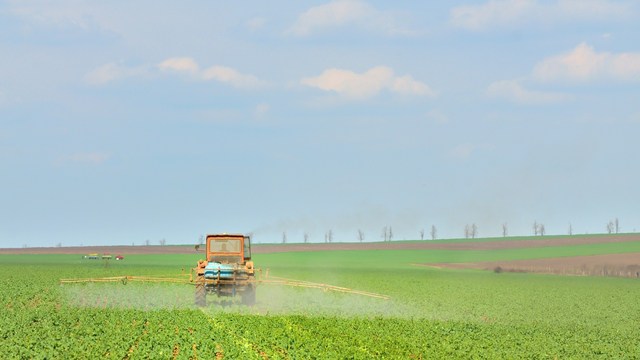 Jordache/PhotoSpin
Jordache/PhotoSpin
Research from UCLA has indicated that exposure to some pesticides may create higher risk for Parkinson's disease.
An earlier study published by the UCLA team in January, 2013 showed a link between benomyl (a fungicide banned by the EPA) and Parkinson's (PD). Benomyl lessened the production of the enzyme aldehyde dehydrogenase (ALDH).
Because ALDH turns aldehydes that are toxic to dopamine cells to a more benign state, a lack of ALDH can heighten the risk of Parkinson's disease.
This research found that a cascade of cellular events is triggered by pesticide exposure. One result was that ALDH did not adequately detoxify DOPAL which is a naturally occurring toxin in the brain. DOPAL then can accumulate causing damage to neurons. The risk for Parkinson's disease rises.
In a more recent study published by the same team in February, 2014 other pesticides were examined. It was seen that there are 11 pesticides that inhibit ALDH and thus raise the risk for PD. It was also seen that negative effects can occur at lower levels than previously suspected.
Study lead author Jeff Bronstein, a professor of neurology and director of movement disorders at UCLA, said that people with a certain common genetic variant are especially at risk from these pesticides.
People with a common genetic variant of the ALDH2 gene had a two to six times higher risk for Parkinson's after exposure to the pesticides.
Bronstein cautioned that just having the variant is not enough to increase the risk for PD however.
Researchers concluded that the pesticides identified should be avoided to safeguard against increased risk for Parkinson's.
They recommended the development of therapies to modulate the activity of the ALDH enzyme, as well as therapies to eliminate toxic aldehydes with the goal of reducing the occurrence of PD, and inhibiting its progression, especially for those who have suffered pesticide exposure.
Parkinson's disease is one of the most common neurological disorders. It is caused by the death and breakdown of neurons (nerve cells) in the brain. There is as yet no known cure.
Symptoms will vary from one person to another. PD is a nervous system disorder that sometimes begins as a slight tremor in one hand. It can also involve slow movement and stiffness.
Blinking, smiling and swinging of arms are some of the automatic movements that can be affected. One side of the body may be more affected than the other.
Facial expression can decrease in occurrence. Speech can become hesitant, and may become monotone. It can be affected by slurring. Posture and balance can be affected. Writing can be difficult, and may be smaller than before.
Symptoms can worsen as time passes, but they may be improved with medication use. Medications that increase or take the place of dopamine may help since Parkinson's causes low concentrations of this neurotransmitter.
Sources:
NEUROBIOLOGY OF PARKINSON'S DISEASE. Mayo.edu. Retrieved April 27, 2014.
http://www.mayo.edu/research/labs/neurobiology-parkinsons-disease/projec...
Parkinson's disease. Mayoclinic.org. Retrieved April 27, 2014.
http://www.mayoclinic.org/diseases-conditions/parkinsons-disease/basics/...
Parkinson's disease. Mayoclinic.org. Retrieved April 27, 2014.
http://www.mayoclinic.org/diseases-conditions/parkinsons-disease/basics/...
Parkinson's disease. Mayoclinic.org. Retrieved April 27, 2014.
http://www.mayoclinic.org/diseases-conditions/parkinsons-disease/basics/...
Pesticides increase risk for Parkinson's disease: Certain people may be more susceptible. Sciencedaily.com. Retrieved April 28, 2014.
http://www.sciencedaily.com/releases/2014/02/140203163428.htm
Visit Jody's website at http://www.ncubator.ca
Reviewed April 28, 2014
by Michele Blacksberg RN






Add a CommentComments
There are no comments yet. Be the first one and get the conversation started!